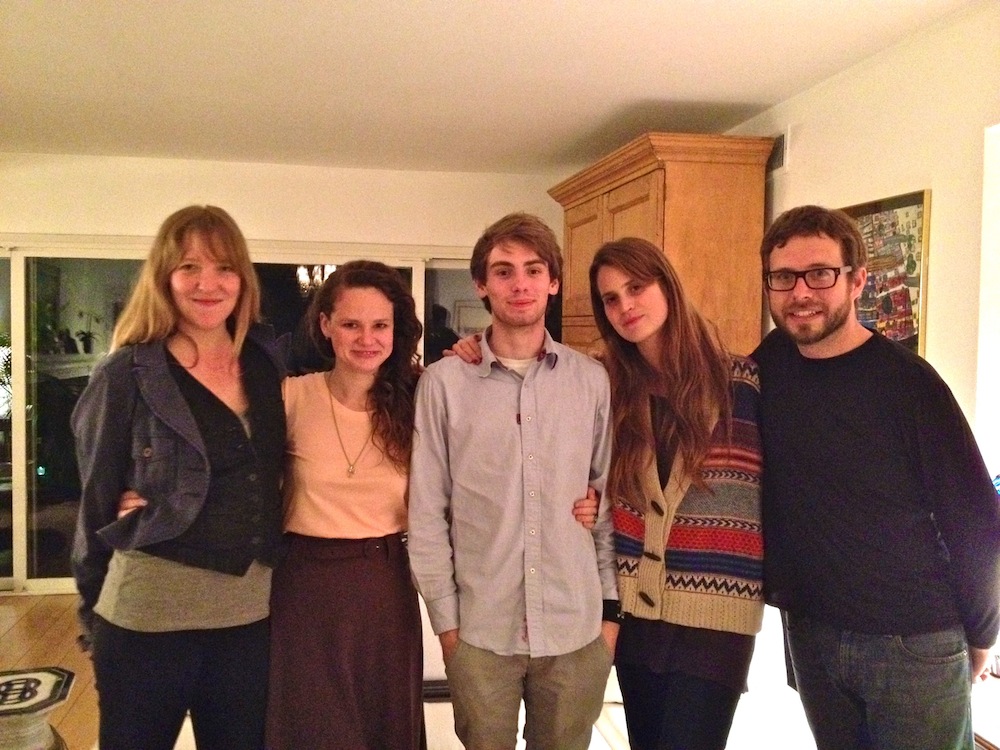When my mother came to Paris for her chemotherapy, it was her very first time on a plane.
The trip was full of meaning. Lucille Arrigan Rice, my mother, was one of the greatest readers ever to live. She had been born and raised in New England and never traveled beyond Washington DC to the south, Quebec City to the north, and New York City to the west. Her reading had taken her everywhere in the world so perhaps she hadn't felt the need to visit places other than through literature. The cost was also an issue; it wasn't so uncommon for teachers, typewriter men, and their children, to think flying was only for the Air Force and rich people.
I was living in Paris and couldn't bear not being with her during her treatment for a brain tumor, so I arranged for her to have chemo at the American Hospital in Neuilly.  She loved Paris immediately; she'd felt a bond with the city since, when pregnant with my youngest sister, she'd spent labor reading Paul Gallico's Mrs. 'Arris goes to Paris, and eventually the baby grew up to marry a Frenchman (here is the baby and her husband, Maureen and Olivier Onorato, in Arcachon, France, where they lived their first year of marriage many moons ago.) (Photo by Amelia Onorato,)
She loved Paris immediately; she'd felt a bond with the city since, when pregnant with my youngest sister, she'd spent labor reading Paul Gallico's Mrs. 'Arris goes to Paris, and eventually the baby grew up to marry a Frenchman (here is the baby and her husband, Maureen and Olivier Onorato, in Arcachon, France, where they lived their first year of marriage many moons ago.) (Photo by Amelia Onorato,)  Anyway, the Gallico book is a magical reference tool in our family, so my sister's marriage, and now my mother's visit to Paris, all seemed quite blessed and cosmic, but that is another story.
Anyway, the Gallico book is a magical reference tool in our family, so my sister's marriage, and now my mother's visit to Paris, all seemed quite blessed and cosmic, but that is another story.
My mother was enchanted by Paris but wanted to go to England. Her grandmother, Gertrude Gibson Harwood Beaudry, was English, so we'd grown up with teatime, silver spoons commemorating Queen Elizabeth's coronation, and a habit i shared with my sisters of practicing English accents while walking on the golf course, pretending it was the Yorkshire Moors. I also invented an imaginary English family, wherein my father was the fabulously dashing Max Gardiner, I had nine brothers and no sisters, and my own bay thoroughbred, on whom I rode hunt seat jolly well. But that too is another story.
Flying across the Channel, my mother was moved to remember my father's service during WWll, how his squadron had given air support to the troops landing on Normandy beaches on D-Day. During our London stay we would visit places my father had stayed on leave from the base at North Pickenham, including a Catholic church hit by a buzz-bomb while my father was at Mass.
Upon landing in England, my mother's smile grew huge, as if she had finally come home. We took a taxi to the Basil Street Hotel, where we had a tiny suite and our own butler. My mother tired easily, so she had to drink bouillon in bed and sleep a while before we could set out to see London.
I had planned an itinerary that I thought she would enjoy, but it went out the window as soon as she woke up. "I want to go straight to Doughty Street," she said. "What's there?" I asked. She looked disappointed in both herself and me, as if she'd failed me in my education and I'd failed myself by not enquiring further. "Charles Dickens' house," she said.
We went straightaway. Dickens had lived in the Georgian terraced house at 48 Doughty Street for two years: he and Catherine moved in right after their marriage in April 1837. Home to the Dickenses and the three eldest of their ten children, two of their daughters were born there. The family moved to larger houses as Dickens became more successful, but none of those other residences survive.
The interior was Victorian, and we wandered--my mother blissfully--through the morning room, drawing room, and brilliantly scholarly library. The house contains the most comprehensive collection of all things Dickens, including first editions and a painting, Dicken's Dream, by R. W. Buss, the artist who'd illustrated The Pickwick Papers.
 I was overjoyed to see early editions of Dombey and Son, a novel my sisters and I loved for its own merit but also because in Franny and Zooey by J.D Salinger, it was the novel Zooey was reading at the kitchen table when Jesus appeared and asked him for a small glass of ginger ale. A small glass, mind you.
I was overjoyed to see early editions of Dombey and Son, a novel my sisters and I loved for its own merit but also because in Franny and Zooey by J.D Salinger, it was the novel Zooey was reading at the kitchen table when Jesus appeared and asked him for a small glass of ginger ale. A small glass, mind you.

My mother adored Dickens. Not just as the literary giant he was, but also, simply as an avid reader, because he wrote such engaging, addictive stories. My mother said, "He wrote such cliffhangers. The books would be published in serials, and readers would be waiting at the loading dock to pick up the next installment." It thrilled her to know that he had written The Pickwick Papers, Oliver Twist, Nicholas Nickleby, and part of Barnaby Rudge while in residence there.
After reluctantly leaving as the house/museum closed for the day, we went to Ye Olde Cheshire Cheese, which was both charming and incredibly touristy, because a woman in the museum had told my mother that Dickens had frequented the pub. My mother couldn't eat, she was too sick, but she leaned back and soaked in the atmosphere, imagining Dickens at the next table--perhaps writing, perhaps thinking of his latest chapter.
Our next stop, the following day, would be at Samuel Johnson's house, as she was quite obsessed with Dr. Johnson and was, back in Connecticut, caring for a stray tiger cat she'd named Boswell after the diarist and author of The Life of Samuel Johnson. But today, in this post, I savor that memory of my mother and our visit with Charles Dickens. It is, after all, Dickens' birthday... Lucille would be the first to bake him a cake.
 Producer : Tamara Edwards
Director: James Gallagher
Director of Photography: Markus Mentzer
Editor: James Gallagher
Production Designer: Tamara Edwards
Illustration by Amelia Onorato
Music: "Bells" by Maesa (Maesa Pullman/Rosa Pullman ASCAP/BMI)
Harrison's Note Calligraphy by Emily J Snyder at Queen Quills
Snowy Owl Productions/New York: Ted O’Gorman
Water Color by Puma Rose
Special Thanks to Sibyl Buck, Chris Traynor, Cynder Niemela, Lindsay Jones, and Dr. Vikki Brock
httpv://www.youtube.com/watch?v=1m243bAMzOI&feature=youtu.be
Producer : Tamara Edwards
Director: James Gallagher
Director of Photography: Markus Mentzer
Editor: James Gallagher
Production Designer: Tamara Edwards
Illustration by Amelia Onorato
Music: "Bells" by Maesa (Maesa Pullman/Rosa Pullman ASCAP/BMI)
Harrison's Note Calligraphy by Emily J Snyder at Queen Quills
Snowy Owl Productions/New York: Ted O’Gorman
Water Color by Puma Rose
Special Thanks to Sibyl Buck, Chris Traynor, Cynder Niemela, Lindsay Jones, and Dr. Vikki Brock
httpv://www.youtube.com/watch?v=1m243bAMzOI&feature=youtu.be








